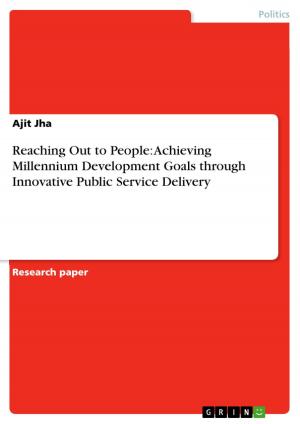Facebook - The symbol of postmodernity?
Nonfiction, Social & Cultural Studies, Social Science, Anthropology| Author: | Tobias Henze | ISBN: | 9783656395072 |
| Publisher: | GRIN Verlag | Publication: | March 20, 2013 |
| Imprint: | GRIN Verlag | Language: | English |
| Author: | Tobias Henze |
| ISBN: | 9783656395072 |
| Publisher: | GRIN Verlag |
| Publication: | March 20, 2013 |
| Imprint: | GRIN Verlag |
| Language: | English |
Seminar paper from the year 2011 in the subject Cultural Studies - Miscellaneous, grade: 8,5, Maastricht University, language: English, abstract: It is the 'world's largest social network' (Stross, 2010) connecting over 600 million users from more than 200 countries on an Internet page that was founded just 7 years ago (Socialbakers, 2011a). The founder, Mark Zuckerberg, was named 'person of the year 2010' (Grossman, 2010) by Time magazine and is ranked number 40 on Forbes' list of the world's most powerful people with a net worth of approximately $13.5 billion (Forbes, 2011). Facebook, the social network this paper is dealing with, has become part of the daily routine of many users sometimes influencing their purchase decisions or even the way they perceive and see the world. Moreover, it has become an Internet brand which can now be regarded to be on an equal level with Amazon, eBay or Google. Without doubt, Facebook has to be regarded as an important feature of growing inter-connectivity which was made possible through the rise and spread of the Internet. The social network enables people to get in touch with each other, find so-called 'friends' all over the world and to create a personal profile representing the user within the Facebook network. Facebook's self-stated mission is 'to give people the power to share and make the world more open and connected' (Facebook, 2011). Of course this 'mission' is not a revolutionary new idea in the World Wide Web as several social networks and micro blogging websites like MySpace, LinkedIn or Twitter show. Still Facebook is the most widely-known, preferred and fastest growing social network of today's world. As a matter of fact it is also often claimed to be the most 'influential social network' (Brennan & Schafer, 2010, p. 19) of our times.
Seminar paper from the year 2011 in the subject Cultural Studies - Miscellaneous, grade: 8,5, Maastricht University, language: English, abstract: It is the 'world's largest social network' (Stross, 2010) connecting over 600 million users from more than 200 countries on an Internet page that was founded just 7 years ago (Socialbakers, 2011a). The founder, Mark Zuckerberg, was named 'person of the year 2010' (Grossman, 2010) by Time magazine and is ranked number 40 on Forbes' list of the world's most powerful people with a net worth of approximately $13.5 billion (Forbes, 2011). Facebook, the social network this paper is dealing with, has become part of the daily routine of many users sometimes influencing their purchase decisions or even the way they perceive and see the world. Moreover, it has become an Internet brand which can now be regarded to be on an equal level with Amazon, eBay or Google. Without doubt, Facebook has to be regarded as an important feature of growing inter-connectivity which was made possible through the rise and spread of the Internet. The social network enables people to get in touch with each other, find so-called 'friends' all over the world and to create a personal profile representing the user within the Facebook network. Facebook's self-stated mission is 'to give people the power to share and make the world more open and connected' (Facebook, 2011). Of course this 'mission' is not a revolutionary new idea in the World Wide Web as several social networks and micro blogging websites like MySpace, LinkedIn or Twitter show. Still Facebook is the most widely-known, preferred and fastest growing social network of today's world. As a matter of fact it is also often claimed to be the most 'influential social network' (Brennan & Schafer, 2010, p. 19) of our times.















